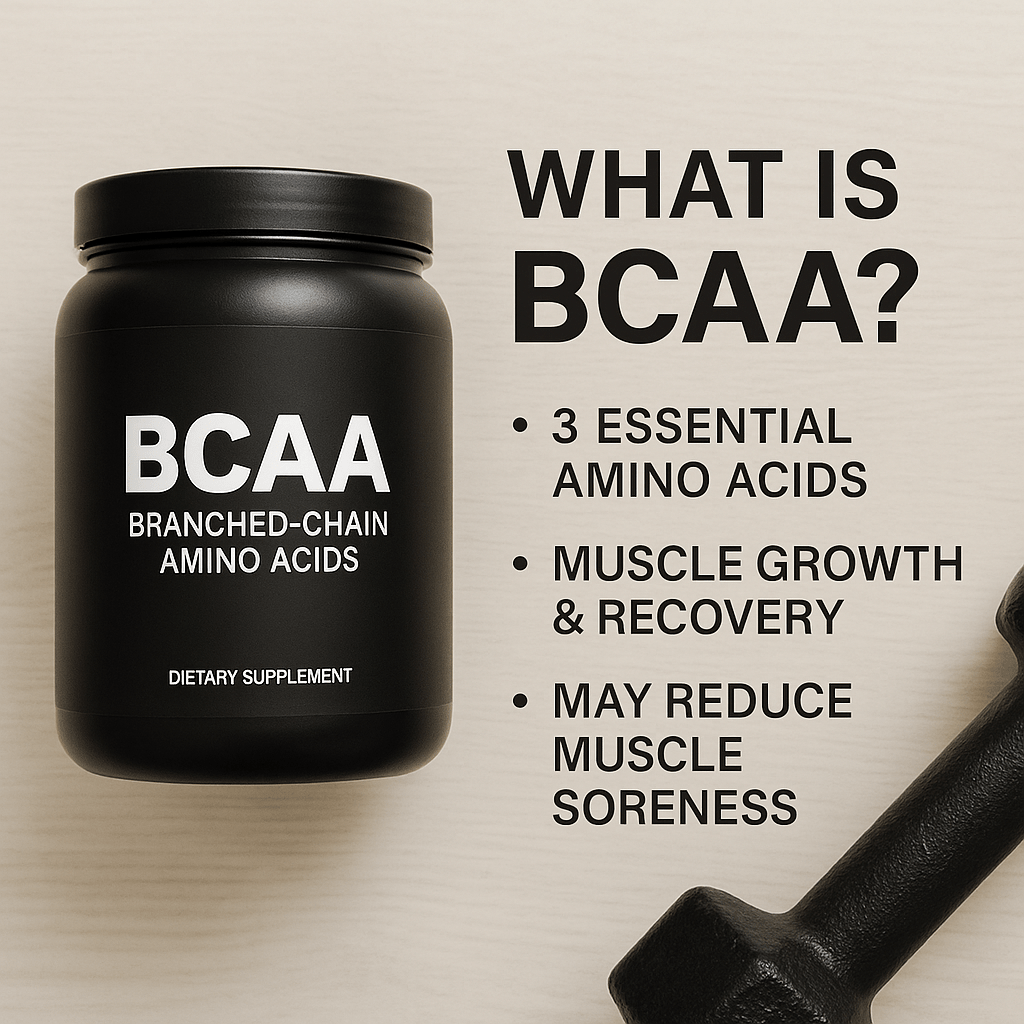What Is BCAA? Benefits, Uses, and Why Your Body Needs It
In the world of fitness, sports nutrition, and muscle recovery, one term appears again and again: BCAA. But what exactly is BCAA? Why do athletes, bodybuilders, and even casual gym-goers include it in their supplement stack?
Whether you’re new to fitness or looking to enhance your recovery and muscle gains, understanding BCAAs (Branched-Chain Amino Acids) can help you make smarter decisions for your performance, endurance, and overall health.
This guide breaks down everything you need to know about BCAAs: what they are, how they work, their benefits, the best time to take them, and whether they’re right for you.
💡 What Are BCAAs?
BCAAs, or Branched-Chain Amino Acids, are a group of three essential amino acids:
-
Leucine
-
Isoleucine
-
Valine
The term “branched-chain” refers to their chemical structure, which has a branched appearance. These amino acids are classified as essential, meaning your body cannot produce them on its own—they must be obtained through diet or supplementation.
They make up about 35–40% of all essential amino acids in your body and are especially concentrated in muscle tissue.
🔬 Why Are BCAAs Important?
While all amino acids play roles in building proteins, BCAAs have unique benefits that set them apart. Unlike other amino acids, BCAAs are primarily metabolized in muscle tissue rather than the liver. This makes them particularly important for:
-
Muscle growth
-
Energy production during exercise
-
Preventing muscle breakdown
-
Faster recovery
🏆 Top 7 Proven Benefits of BCAAs
1. Boosts Muscle Growth
The standout benefit of BCAAs—especially leucine—is their role in stimulating muscle protein synthesis, which is essential for muscle growth.
Several studies show that taking BCAAs after resistance training:
-
Triggers anabolic signaling pathways
-
Helps build lean muscle mass
-
Can enhance long-term gains when taken consistently with a high-protein diet
2. Reduces Muscle Soreness
BCAAs may help reduce delayed-onset muscle soreness (DOMS), which can occur 12–24 hours after intense workouts.
How?
-
They reduce muscle damage
-
Help minimize inflammation
-
Support faster repair of muscle fibers
This is why many athletes take BCAAs before or during training.
3. Prevents Muscle Wasting
During calorie deficits, intense exercise, or prolonged illness, your body may begin to break down muscle for energy. This is known as muscle catabolism.
BCAAs help preserve lean muscle tissue by:
-
Providing energy during exercise
-
Reducing muscle protein breakdown
This is especially important for:
-
People cutting weight
-
Athletes in endurance sports
-
Older adults preventing sarcopenia (age-related muscle loss)
4. Improves Exercise Performance
BCAAs help delay fatigue during exercise by lowering serotonin production in the brain (which is linked to tiredness).
They also:
-
Reduce ammonia buildup
-
Enhance mental focus
-
Support sustained performance in both strength and endurance activities
5. Supports Fat Loss
While not a fat burner, BCAAs can help with weight loss by:
-
Preserving muscle mass (which boosts metabolism)
-
Supporting workouts during low-carb or calorie-restricted diets
Some studies suggest that higher BCAA intake is associated with better body composition and lower fat mass.
6. Supports Immune Function
During intense training, your immune system can weaken. BCAAs contribute to the production of glutamine, another amino acid that fuels immune cells, helping keep your defenses strong during high-stress periods.
7. Helps with Liver Disease Management
Research shows that BCAA supplementation can be helpful for people with liver cirrhosis or hepatic encephalopathy, improving both nutritional status and mental clarity.
🥩 Food Sources of BCAAs
You don’t have to rely on supplements to get BCAAs—many protein-rich foods contain them naturally.
Top BCAA food sources include:
-
Chicken breast
-
Beef
-
Eggs
-
Salmon and tuna
-
Whey protein isolate
-
Greek yogurt
-
Tempeh and tofu (plant-based)
However, for precision dosing or use around workouts, BCAA supplements offer convenience and speed of absorption.
🕒 When Is the Best Time to Take BCAAs?
The ideal timing depends on your goals:
| Goal | Best Time to Take BCAAs |
|---|---|
| Muscle growth | Post-workout or with meals |
| Fatigue prevention | Before or during training |
| Muscle preservation (cutting phase) | In between meals or fasted cardio |
| Recovery | After workout or before bed |
Most BCAA supplements come in 2:1:1 ratio (Leucine:Isoleucine:Valine), which is widely considered most effective.
💊 BCAAs vs. EAAs: What’s the Difference?
While BCAAs include 3 essential amino acids, EAAs (Essential Amino Acids) include all 9 essential aminos your body can’t make.
BCAAs:
-
Great for targeted muscle repair and growth
-
Fast-acting and ideal for peri-workout use
EAAs:
-
Better for overall protein synthesis
-
Great if your diet is low in protein
Some athletes use both for different purposes.
❓Are BCAA Supplements Safe?
Yes, BCAA supplements are considered safe for healthy individuals when taken in recommended doses (typically 5–10g per serving).
However:
-
People with Maple Syrup Urine Disease (MSUD) or liver/kidney conditions should consult a doctor.
-
Always choose third-party tested brands to ensure purity and avoid contaminants.
🔎 What to Look for in a Quality BCAA Supplement
To get the most out of your BCAA supplement, choose products that are:
✅ Clean-Label
-
No artificial dyes, sweeteners, or fillers
-
Naturally flavored and sweetened (e.g., with stevia)
✅ Proper Ratio
-
2:1:1 ratio (Leucine:Isoleucine:Valine) is ideal
✅ Fast-Dissolving and Bioavailable
-
Micronized forms for better absorption
-
Can be mixed in water, smoothies, or pre/post-workout shakes
👥 Who Should Use BCAAs?
-
Bodybuilders & Strength Athletes
-
Endurance Runners & Cyclists
-
People in Calorie Deficits or Fasting
-
Vegans/Vegetarians (who may lack BCAAs in diet)
-
Older Adults maintaining muscle mass
🧠 Final Thoughts: Are BCAAs Worth It?
If you’re serious about improving your muscle recovery, endurance, and performance, then BCAAs are a science-backed, safe, and effective tool to add to your supplement arsenal.
When paired with a protein-rich diet, smart training, and rest, BCAAs can help you push harder, recover faster, and stay leaner—especially during intense workout phases or weight cuts.



